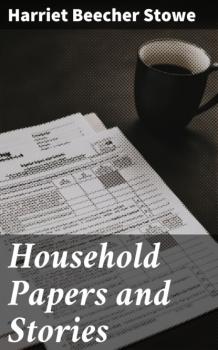Гарриет Бичер-Стоу
Список книг автора Гарриет Бичер-СтоуHousehold Papers and Stories
"Household Papers and Stories" by Harriet Beecher Stowe. Published by Good Press. Good Press publishes a wide range of titles that encompasses every genre. From well-known classics & literary fiction and non-fiction to forgotten−or yet undiscovered gems−of world literature, we issue the books that need to be read. Each Good Press edition has been meticulously edited and formatted to boost readability for all e-readers and devices. Our goal is to produce eBooks that are user-friendly and accessible to everyone in a high-quality digital format.
Agnes of Sorrento
"Agnes of Sorrento" by Harriet Beecher Stowe. Published by Good Press. Good Press publishes a wide range of titles that encompasses every genre. From well-known classics & literary fiction and non-fiction to forgotten−or yet undiscovered gems−of world literature, we issue the books that need to be read. Each Good Press edition has been meticulously edited and formatted to boost readability for all e-readers and devices. Our goal is to produce eBooks that are user-friendly and accessible to everyone in a high-quality digital format.
Life of Harriet Beecher Stowe
"Life of Harriet Beecher Stowe" by Harriet Beecher Stowe. Published by Good Press. Good Press publishes a wide range of titles that encompasses every genre. From well-known classics & literary fiction and non-fiction to forgotten−or yet undiscovered gems−of world literature, we issue the books that need to be read. Each Good Press edition has been meticulously edited and formatted to boost readability for all e-readers and devices. Our goal is to produce eBooks that are user-friendly and accessible to everyone in a high-quality digital format.
Lady Byron Vindicated
"Lady Byron Vindicated" by Harriet Beecher Stowe. Published by Good Press. Good Press publishes a wide range of titles that encompasses every genre. From well-known classics & literary fiction and non-fiction to forgotten−or yet undiscovered gems−of world literature, we issue the books that need to be read. Each Good Press edition has been meticulously edited and formatted to boost readability for all e-readers and devices. Our goal is to produce eBooks that are user-friendly and accessible to everyone in a high-quality digital format.
Uncle Tom’s Cabin
HarperCollins is proud to present its new range of best-loved, essential classics.‘One thing is certain, – that there is a mustering among the masses, the world over; and there is a dis irae coming on, sooner or later.’Viewed by many as fuelling the abolitionist movement of the 1850s and laying the groundwork for the Civil War, Harriet Beecher Stowe’s sentimental and moral tale of slaves attempting to secure their freedom was one of the most popular books of the nineteenth century. Centred round the long-suffering Uncle Tom, a devout Christian slave who endures cruelty and abuse from his owners, Tom is often celebrated as the first black hero in American fiction who refuses to obey his white masters. With other strong protagonists such as Eliza, a courageous slave who flees to the North with her son when she learns that he is to be sold, Beecher Stowe highlighted the plight of southern slaves and the breaking up of black families. Not without its controversy, more recent criticism has suggested that the novel contributed negatively to the stereotyping of the black community.
Betty's Bright Idea, Deacon Pitkin's Farm, and The First Christmas in New England
Harriet Beecher Stowe (1811-1891) made her name as an abolitionist and author most noted for her 1832 breakout novel «Uncle Tom's Cabin.» Here are collected three of Beecher's most treasured short stories. In «Betty's Bright Idea,» a sweet young girl forms a bond with a poor family and is determined to help them make a better life for themselves. In «Deacon Pitkin's farm,» a young boy whose family can no longer afford payments on their house chooses to forego schooling in order to help make money for his struggling kin. Lastly, «The First Christmas in New England» documents the first Christmas celebration of the pilgrims from the Mayflower, a truly joyous and heartwarming tale. All three stories create a special portrait of American life as seen by the less fortunate.









